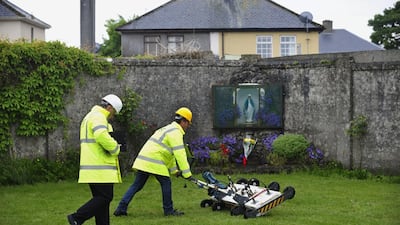DUBLIN // Women’s groups are calling for other Catholic-run former homes for unmarried mothers to be investigated after a mass grave containing the remains of dozens of babies and young children was discovered at one such home.
Roman Catholic religious orders ran homes for unmarried pregnant girls until well into the 1990s all over Ireland. The young women sent to them often suffered harsh treatment at the hands of the nuns who believed sex outside marriage was a mortal sin.
The coalition of mother and baby home survivors called the shocking discovery of the mass grave “the tip of the iceberg.”
Nearly 800 children died at the Bon Secours Mother and Baby Home in the town of Tuam, in western Ireland, according to death certificates discovered by a local historian, Catherine Corless. The home was one of several throughout strongly Catholic Ireland.
Run by the Bon Secours order of nuns, the Tuam home opened in 1925 and closed in 1961. The “significant quantities” of remains were found in 17 out of 20 underground chambers that were examined. The investigators established the chambers were originally used to treat sewage.
While the deaths of these children were not suspicious, the casual disposal of their bodies has horrified the country.
“Today is about remembering and respecting the dignity of the children who lived their short lives in this home,” Katherine Zappone, Ireland’s minister for children and youth affairs, said in a statement on Friday. “We will honour their memory and make sure that we take the right actions now to treat their remains appropriately.”
No record exists of the number of women who passed through the home during the time it was open. The nuns would help deliver the babies, who would then be brought up elsewhere until they could be adopted.
But the babies and children who died at the home were buried in these crypt-like chambers. Investigators said that DNA analysis confirmed that the discovered remains were of children between the ages of 35 weeks and three years.
“It’s horrific what they did,” Ms Corless said.
After it closed in 1961, the home lay vacant until it was demolished in 1972 to make way for a new housing estate. The first signs of the mass grave were spotted in 1975 when two young boys, playing in a field on the old site of the home found skeletons inside a hollow covered by a concrete slab. But no investigation was conducted at the time.
Ms Corless, who works on her family’s farm, was familiar with the town’s stories about child deaths the home, but she could find no records documenting their burials.
In 2011, she began to source death certificates for every child who had died at the home, paying four euros (Dh15) to the country registry office for each certificate copy. In total, she procured 796 certificates and they revealed the children had died of measles, tuberculosis, pneumonia, or simply malnutrition.
With other townsfolk Ms Corless began to raise money to erect a memorial for the children who had died at the home. As the story gathered attention, the Irish government in 2014 appointed a Mother and Baby Homes commission to investigate other such homes across the country.
The Bon Secours order, which is still operational and now runs hospitals issued a statement following the commission’s revelations.
“On the closing of the home in 1961, all the records for the home were returned to Galway County Council, who are the owners and occupiers of the lands of the home,” the statement said. “We can therefore make no comment on today’s announcement, other than to confirm our continued cooperation with and support for the work of the commission in seeking the truth about the home.”
P J Haverty, who grew up in the home and was then placed in foster care at the age of six, called the facility “a prison”.
“There was no love, no nothing,” Mr Haverty told CBC Radio. He wants not only the Catholic church but also the Irish government to apologise for the way he and others in the home were treated.
Ms Corless said the government needs to contact any former resident of the home who is still living, “because it is their families that are buried there”. The bones of the children should be extracted and buried in Tuam’s main graveyard, she said.
“At least we know this now,” she said. “It is a huge step forward. We know they’re there now.”
ssubramanian@thenational.ae

